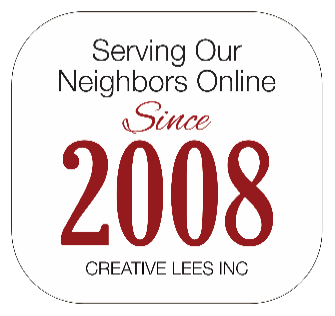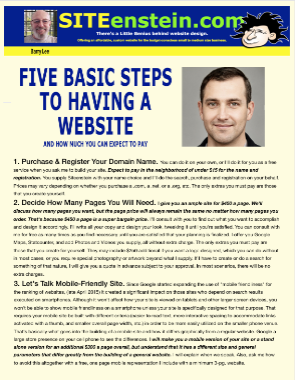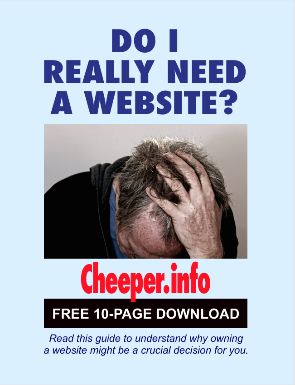FREE 15-PAGE REPORT BY EMAIL!
Click anywhere on the article that interests you.

FREE DOWNLOADS
No Credit Card Info needed
No Name or Email Info needed
You're Welcome!
Just click on the image you want.
Don't try to fool the public with your advertising because the joke will be on you.
You're excited about running your new ad and you're equally certain that this one's going to be a winner. Maybe some of your facts are a bit fudged, but you think, "Isn't that what creative advertising is all about?" Better rethink your attitude about advertising if you equate creative with deceptive and save yourself a lot of wasted advertising dollars while you're at it.
I am sometimes amazed at the headlines that some advertisers use to draw me into reading their ads. Relevance aside, who comes up with these ideas? Years ago for instance, the younger Bush controversially pardoned someone before leaving office, and an automobile dealer or his agency, leaped at the opportunity to run a headline that said: Presidential Price Pardon! Huh? What does that mean? No explanatory subhead, just the headline and right into the usual blah, blah, blah. Never another reference to it after that. Believe me, if you should draw someone into your ad with a meaningless headline like that, they'll not be there long.
The reader of your ad is no dope.
If you think that being creative means fooling people, then you are wasting your money. If you're paying a lot of money to run an ad, don't waste the opportunity to get business by leading off with a bad, meaningless or otherwise badly phrased headline that squanders your hard-earned advertising dollars. And don't think that a disclaimer is going to save you; people today are getting savvy to those tricks.
Creativity is a real art form.
It is extremely tough to be creative in a practical fashion; it requires a lot of thought and talent to attract customers and avoid turning them away with a lingering bad taste in their mouths. A simple, straightforward headline that informs and educates is a lot better than a bad, so-called creative headline. Telling your reader that you are running a sale or savings event is a lot better than "we must sell 300 widgets this weekend" without offering a valid reason why. Who cares! Is it an inventory reduction to allow for the delivery of new merchandise? I can understand that, but offer me no reason and I'm thinking that your omission is a form of trickery and I will not be coming down to your place so you can take over performing your magic on me in person.
Consider the following.
People Prefer Paul's Pleasing Prices on Packaged Products at Pollywagger or Sandy's Serious Seafood Selection at Super Sensational Savings are fun ways of attracting readers without insulting anyone. A real alliteration takes work and is not trying to fool, just entertain. It could even be extended into a memorable campaign device that has you coming up with a different version each week. On radio and TV, you could develop the idea into a jingle or a way of creating a humorous intro or tag, or creating a giveaway for the best alliteration submitted by customers in a weekly contest.
There's no "rope-a-dope" in advertising.
If whatever you do looks like you have something interesting to offer, people will stop to read. If you create the slightest feeling of mistrust, whether by blatant falsehood or overt omission, you'll ruin any chance you have of getting them as a customer. Be entertaining by being clever, but most of all, be honest. That way, your ads won't cost you, they'll earn you new customers. Here's to more honest advertisers. Barry
Getting the word out to potential customers can be done quickly with a well thought out email campaign, but doing it yourself is a big responsibility, since it's important to follow all government guidelines governing this form of business solicitation.
Your first plan of action should be the development of your mailing list. There are reasons that purchasing or renting lists may be unreliable. They may contain out-of-date information because the people who are on them may not have given their permission to be solicited, or they may have subscribed to receive emails in other product categories than what you are sending. Buying or renting a list could wind up to be a shortcut to disaster that you can ill afford, both monetarily, in the loss of valuable time, and in potential fines you may incur by unauthorized solicitations. The guidelines for this are spelled out in the link I have provided below:
https://www.ftc.gov/tips-advice/business-center/guidance/can-spam-act-compliance-guide-business
So it’s time to “roll up your sleeves” and get to it the old fashioned way. Make a list of all your friends, business associates, acquaintances, previous customers, family members, and anyone else you can think of to send an email to learn if they would be amenable to receiving announcements from your business. You might even want to go to the next level, asking them if they wouldn’t mind forwarding your email to a number of their own email contacts. If those new people would forward it again to their contacts you’ve got a chain of new email contacts that just keeps growing. That’s the pushy part, but however you word your request in order to get them to go the extra distance for you, the bottom line is to create a domino effect for gathering names.
Here are some additional ways to build your list.
If you happen to develop an incentive other than just depending on your relationship with these people, that would be even better and could be passed on to everyone who’s asked to comply. In this way, you can see that it’s entirely possible to build up a sizable and reliable list on your own. The trick now is how to make this list grow without much more additional effort by factoring in some creative thinking on your part. If you have an office, store, or website, ask visitors to fill out an email survey that promises to send them product updates, savings announcements, and things of that nature. If you’re a restaurant, you might ask them to complete a small 3x5 questionnaire that promises you’ll contact them with an email invitation for a free dinner celebrating their special event(s); if you’re a tradesperson that works inside people’s homes, you could offer to send them free discount coupons from time to time that could be used for future services. On the internet, your site could feature an email gathering form that promises something in exchange for the information. The bigger your list grows, so too does your opportunity to connect with a new customer. This is the time to stretch your imagination and devise the most creative ways of expanding this very important contact base. Barry.
Start building your list
for an email campaign.
CheapAdvertisingGuy



